RCL University HSO4001 Essay: Organ Donation Accountability Analysis
VerifiedAdded on 2023/06/10
|9
|2363
|205
Essay
AI Summary
This essay delves into the critical aspects of accountability within the context of organ donation in health and social care. It defines organ donation and emphasizes the ethical and legal responsibilities of health and social care practitioners. The essay explores the various areas of accountability, including the self, patients/public, employers, and professional regulators, highlighting their specific roles in ensuring ethical practices and patient care. Furthermore, it underscores the significance of meticulous record-keeping, detailing the types of records maintained and the importance of data privacy and accuracy. The essay also discusses the importance of maintaining up-to-date records, including patient conditions, treatment details, and information on guardians. By examining these interconnected elements, the essay provides a comprehensive overview of the accountability framework in organ donation, aiming to ensure the well-being of both donors and recipients.
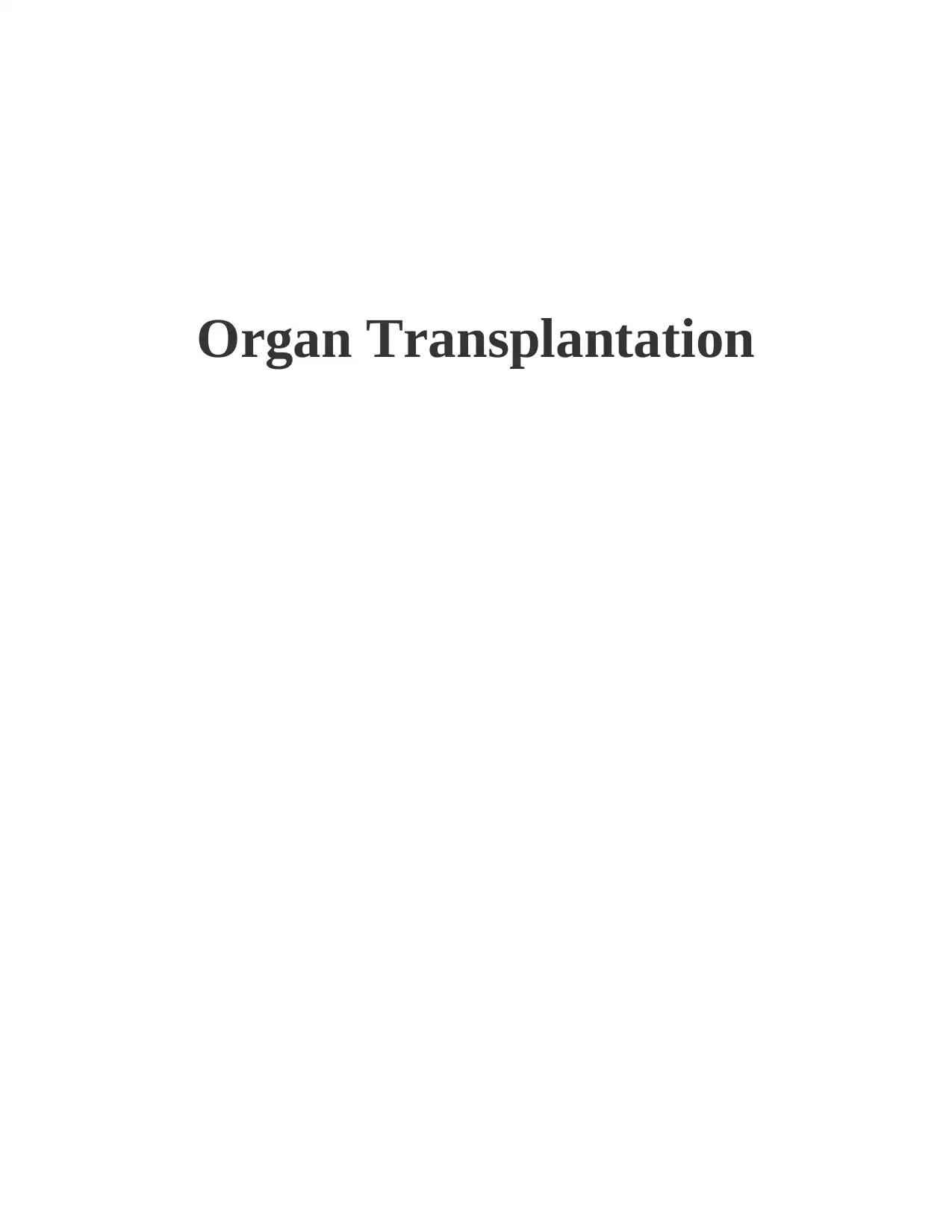
Organ Transplantation
Paraphrase This Document
Need a fresh take? Get an instant paraphrase of this document with our AI Paraphraser
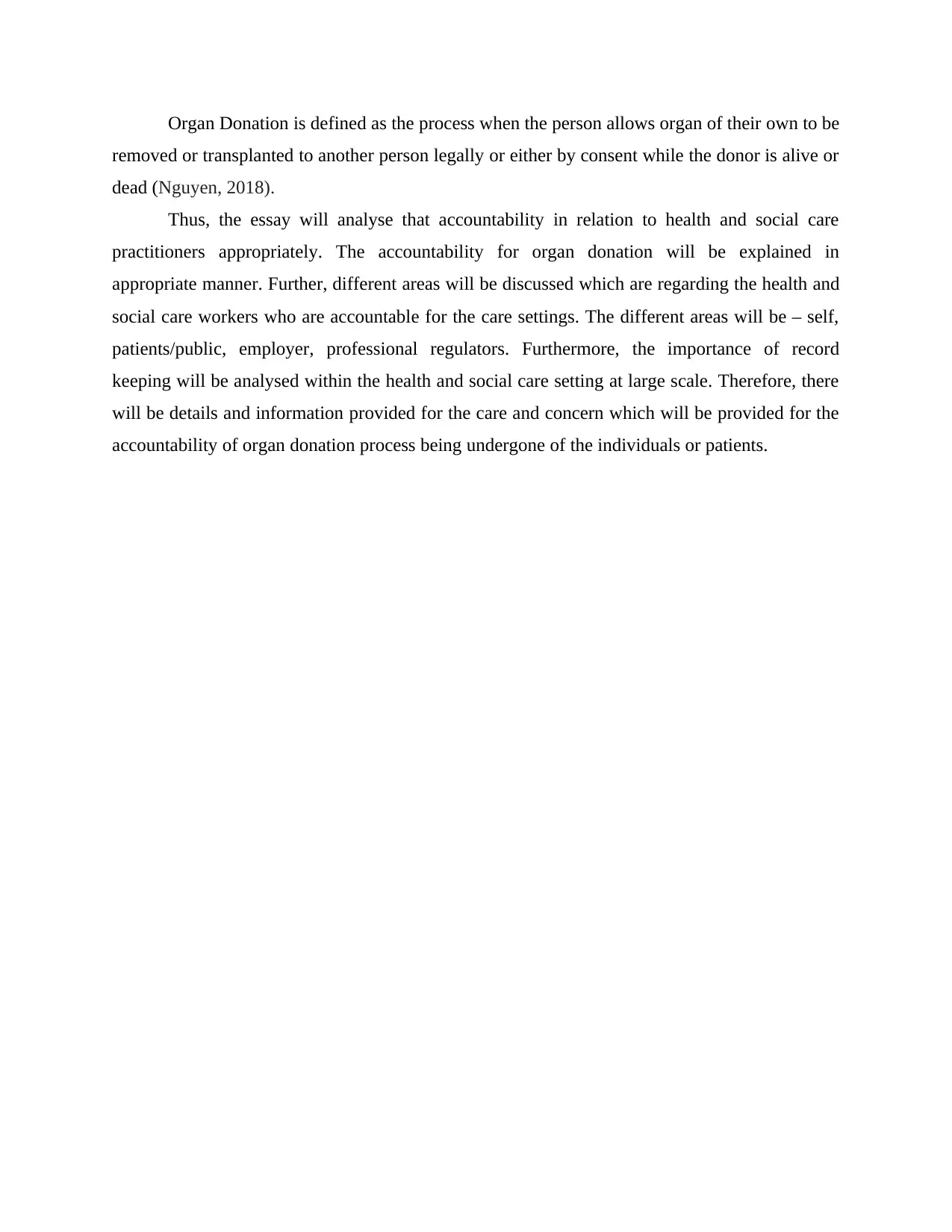
Organ Donation is defined as the process when the person allows organ of their own to be
removed or transplanted to another person legally or either by consent while the donor is alive or
dead (Nguyen, 2018).
Thus, the essay will analyse that accountability in relation to health and social care
practitioners appropriately. The accountability for organ donation will be explained in
appropriate manner. Further, different areas will be discussed which are regarding the health and
social care workers who are accountable for the care settings. The different areas will be – self,
patients/public, employer, professional regulators. Furthermore, the importance of record
keeping will be analysed within the health and social care setting at large scale. Therefore, there
will be details and information provided for the care and concern which will be provided for the
accountability of organ donation process being undergone of the individuals or patients.
removed or transplanted to another person legally or either by consent while the donor is alive or
dead (Nguyen, 2018).
Thus, the essay will analyse that accountability in relation to health and social care
practitioners appropriately. The accountability for organ donation will be explained in
appropriate manner. Further, different areas will be discussed which are regarding the health and
social care workers who are accountable for the care settings. The different areas will be – self,
patients/public, employer, professional regulators. Furthermore, the importance of record
keeping will be analysed within the health and social care setting at large scale. Therefore, there
will be details and information provided for the care and concern which will be provided for the
accountability of organ donation process being undergone of the individuals or patients.
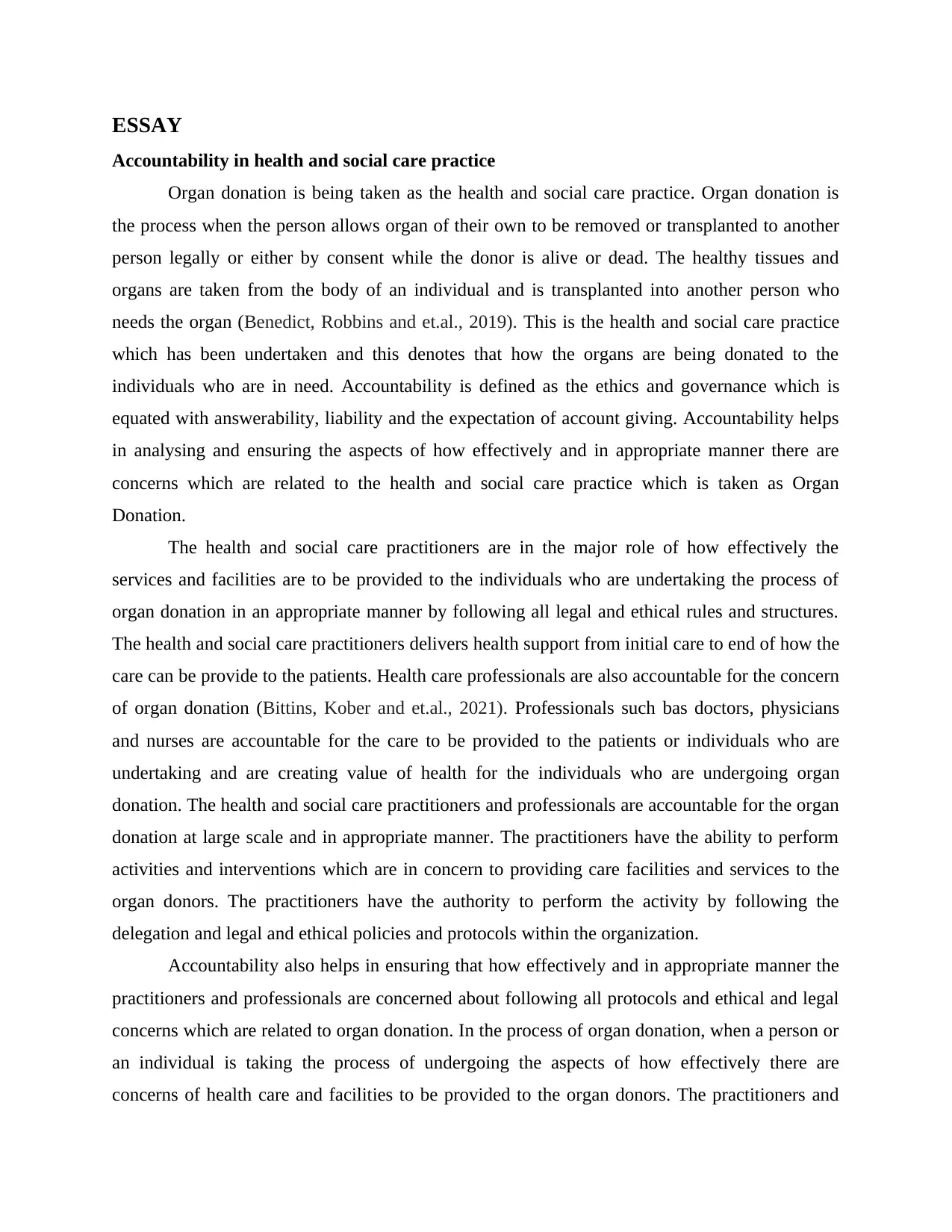
ESSAY
Accountability in health and social care practice
Organ donation is being taken as the health and social care practice. Organ donation is
the process when the person allows organ of their own to be removed or transplanted to another
person legally or either by consent while the donor is alive or dead. The healthy tissues and
organs are taken from the body of an individual and is transplanted into another person who
needs the organ (Benedict, Robbins and et.al., 2019). This is the health and social care practice
which has been undertaken and this denotes that how the organs are being donated to the
individuals who are in need. Accountability is defined as the ethics and governance which is
equated with answerability, liability and the expectation of account giving. Accountability helps
in analysing and ensuring the aspects of how effectively and in appropriate manner there are
concerns which are related to the health and social care practice which is taken as Organ
Donation.
The health and social care practitioners are in the major role of how effectively the
services and facilities are to be provided to the individuals who are undertaking the process of
organ donation in an appropriate manner by following all legal and ethical rules and structures.
The health and social care practitioners delivers health support from initial care to end of how the
care can be provide to the patients. Health care professionals are also accountable for the concern
of organ donation (Bittins, Kober and et.al., 2021). Professionals such bas doctors, physicians
and nurses are accountable for the care to be provided to the patients or individuals who are
undertaking and are creating value of health for the individuals who are undergoing organ
donation. The health and social care practitioners and professionals are accountable for the organ
donation at large scale and in appropriate manner. The practitioners have the ability to perform
activities and interventions which are in concern to providing care facilities and services to the
organ donors. The practitioners have the authority to perform the activity by following the
delegation and legal and ethical policies and protocols within the organization.
Accountability also helps in ensuring that how effectively and in appropriate manner the
practitioners and professionals are concerned about following all protocols and ethical and legal
concerns which are related to organ donation. In the process of organ donation, when a person or
an individual is taking the process of undergoing the aspects of how effectively there are
concerns of health care and facilities to be provided to the organ donors. The practitioners and
Accountability in health and social care practice
Organ donation is being taken as the health and social care practice. Organ donation is
the process when the person allows organ of their own to be removed or transplanted to another
person legally or either by consent while the donor is alive or dead. The healthy tissues and
organs are taken from the body of an individual and is transplanted into another person who
needs the organ (Benedict, Robbins and et.al., 2019). This is the health and social care practice
which has been undertaken and this denotes that how the organs are being donated to the
individuals who are in need. Accountability is defined as the ethics and governance which is
equated with answerability, liability and the expectation of account giving. Accountability helps
in analysing and ensuring the aspects of how effectively and in appropriate manner there are
concerns which are related to the health and social care practice which is taken as Organ
Donation.
The health and social care practitioners are in the major role of how effectively the
services and facilities are to be provided to the individuals who are undertaking the process of
organ donation in an appropriate manner by following all legal and ethical rules and structures.
The health and social care practitioners delivers health support from initial care to end of how the
care can be provide to the patients. Health care professionals are also accountable for the concern
of organ donation (Bittins, Kober and et.al., 2021). Professionals such bas doctors, physicians
and nurses are accountable for the care to be provided to the patients or individuals who are
undertaking and are creating value of health for the individuals who are undergoing organ
donation. The health and social care practitioners and professionals are accountable for the organ
donation at large scale and in appropriate manner. The practitioners have the ability to perform
activities and interventions which are in concern to providing care facilities and services to the
organ donors. The practitioners have the authority to perform the activity by following the
delegation and legal and ethical policies and protocols within the organization.
Accountability also helps in ensuring that how effectively and in appropriate manner the
practitioners and professionals are concerned about following all protocols and ethical and legal
concerns which are related to organ donation. In the process of organ donation, when a person or
an individual is taking the process of undergoing the aspects of how effectively there are
concerns of health care and facilities to be provided to the organ donors. The practitioners and
⊘ This is a preview!⊘
Do you want full access?
Subscribe today to unlock all pages.

Trusted by 1+ million students worldwide
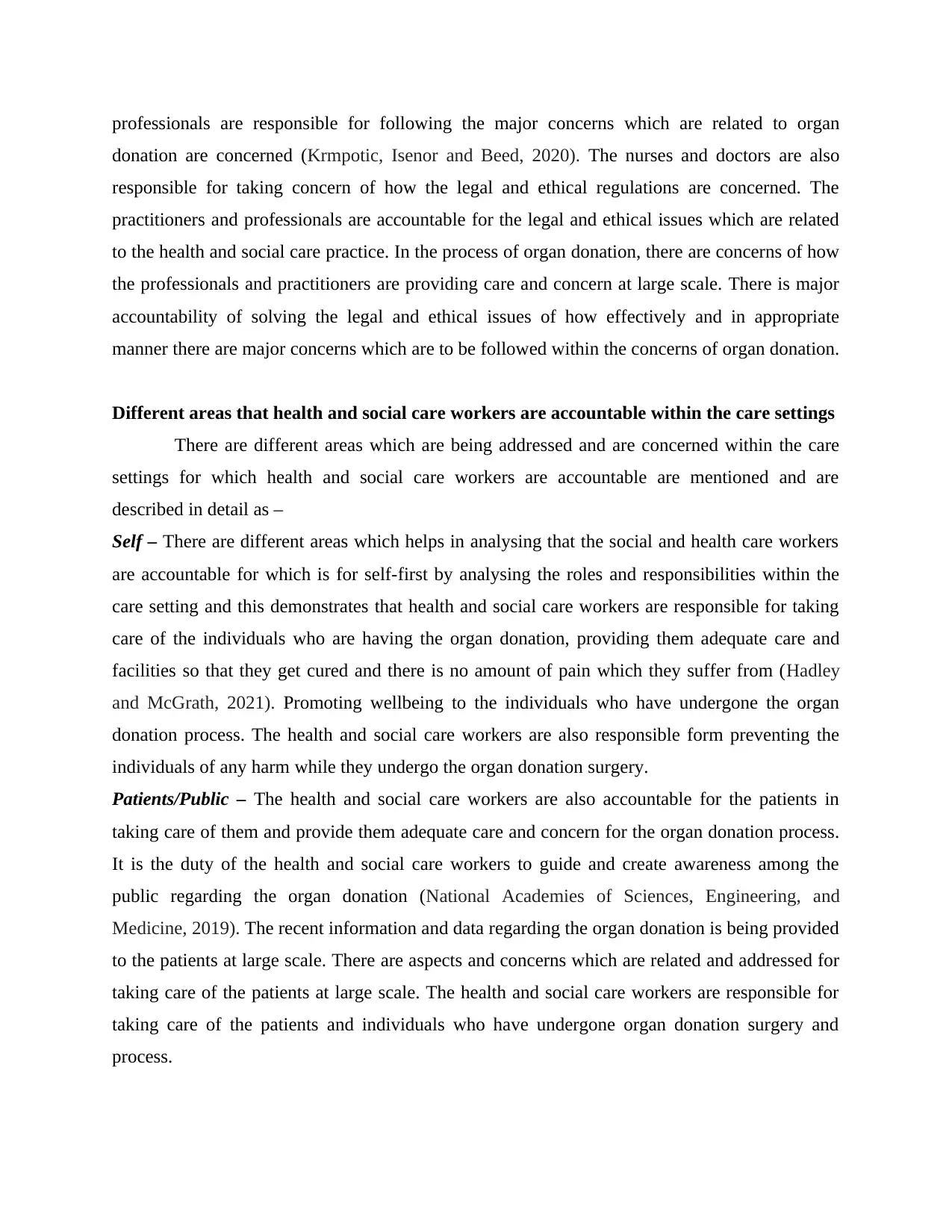
professionals are responsible for following the major concerns which are related to organ
donation are concerned (Krmpotic, Isenor and Beed, 2020). The nurses and doctors are also
responsible for taking concern of how the legal and ethical regulations are concerned. The
practitioners and professionals are accountable for the legal and ethical issues which are related
to the health and social care practice. In the process of organ donation, there are concerns of how
the professionals and practitioners are providing care and concern at large scale. There is major
accountability of solving the legal and ethical issues of how effectively and in appropriate
manner there are major concerns which are to be followed within the concerns of organ donation.
Different areas that health and social care workers are accountable within the care settings
There are different areas which are being addressed and are concerned within the care
settings for which health and social care workers are accountable are mentioned and are
described in detail as –
Self – There are different areas which helps in analysing that the social and health care workers
are accountable for which is for self-first by analysing the roles and responsibilities within the
care setting and this demonstrates that health and social care workers are responsible for taking
care of the individuals who are having the organ donation, providing them adequate care and
facilities so that they get cured and there is no amount of pain which they suffer from (Hadley
and McGrath, 2021). Promoting wellbeing to the individuals who have undergone the organ
donation process. The health and social care workers are also responsible form preventing the
individuals of any harm while they undergo the organ donation surgery.
Patients/Public – The health and social care workers are also accountable for the patients in
taking care of them and provide them adequate care and concern for the organ donation process.
It is the duty of the health and social care workers to guide and create awareness among the
public regarding the organ donation (National Academies of Sciences, Engineering, and
Medicine, 2019). The recent information and data regarding the organ donation is being provided
to the patients at large scale. There are aspects and concerns which are related and addressed for
taking care of the patients at large scale. The health and social care workers are responsible for
taking care of the patients and individuals who have undergone organ donation surgery and
process.
donation are concerned (Krmpotic, Isenor and Beed, 2020). The nurses and doctors are also
responsible for taking concern of how the legal and ethical regulations are concerned. The
practitioners and professionals are accountable for the legal and ethical issues which are related
to the health and social care practice. In the process of organ donation, there are concerns of how
the professionals and practitioners are providing care and concern at large scale. There is major
accountability of solving the legal and ethical issues of how effectively and in appropriate
manner there are major concerns which are to be followed within the concerns of organ donation.
Different areas that health and social care workers are accountable within the care settings
There are different areas which are being addressed and are concerned within the care
settings for which health and social care workers are accountable are mentioned and are
described in detail as –
Self – There are different areas which helps in analysing that the social and health care workers
are accountable for which is for self-first by analysing the roles and responsibilities within the
care setting and this demonstrates that health and social care workers are responsible for taking
care of the individuals who are having the organ donation, providing them adequate care and
facilities so that they get cured and there is no amount of pain which they suffer from (Hadley
and McGrath, 2021). Promoting wellbeing to the individuals who have undergone the organ
donation process. The health and social care workers are also responsible form preventing the
individuals of any harm while they undergo the organ donation surgery.
Patients/Public – The health and social care workers are also accountable for the patients in
taking care of them and provide them adequate care and concern for the organ donation process.
It is the duty of the health and social care workers to guide and create awareness among the
public regarding the organ donation (National Academies of Sciences, Engineering, and
Medicine, 2019). The recent information and data regarding the organ donation is being provided
to the patients at large scale. There are aspects and concerns which are related and addressed for
taking care of the patients at large scale. The health and social care workers are responsible for
taking care of the patients and individuals who have undergone organ donation surgery and
process.
Paraphrase This Document
Need a fresh take? Get an instant paraphrase of this document with our AI Paraphraser
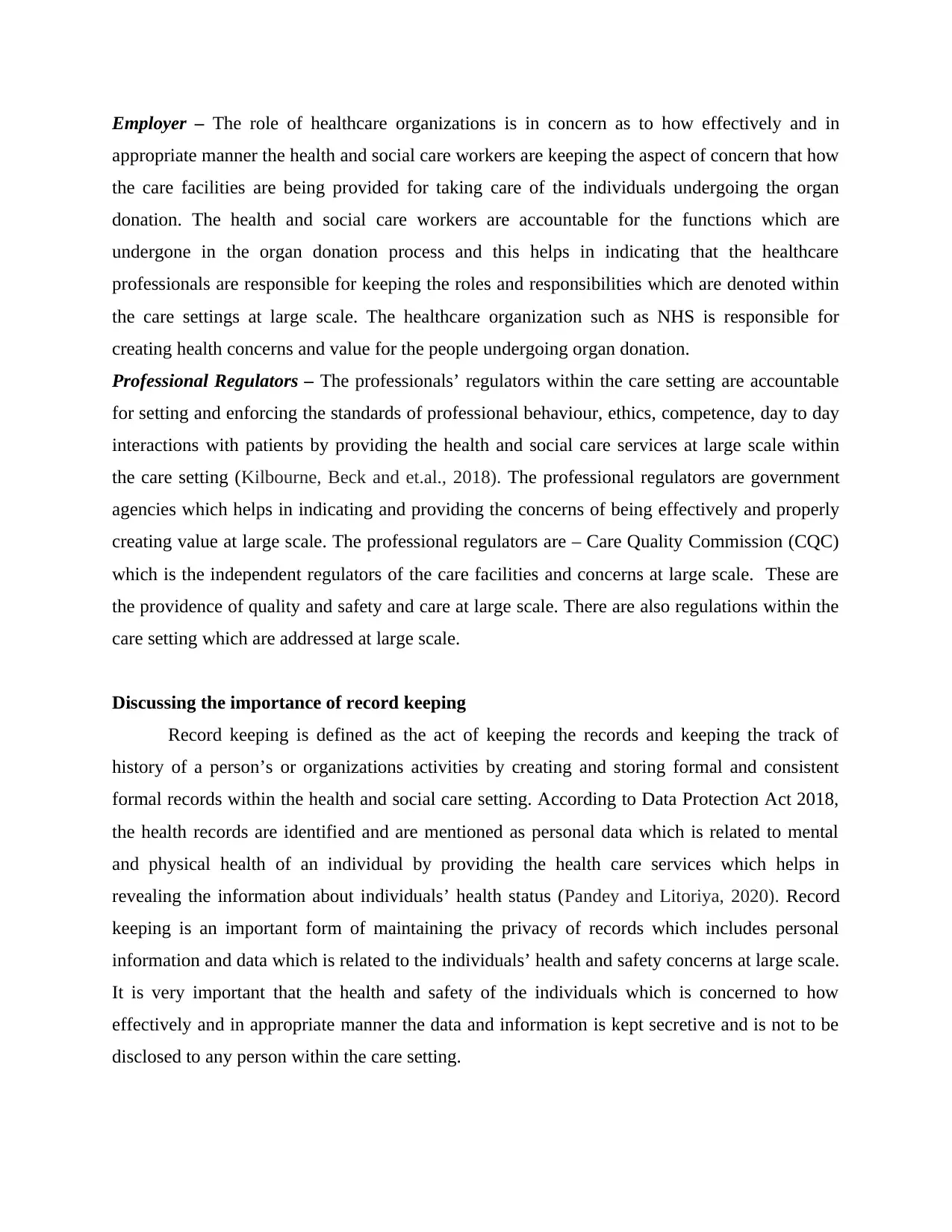
Employer – The role of healthcare organizations is in concern as to how effectively and in
appropriate manner the health and social care workers are keeping the aspect of concern that how
the care facilities are being provided for taking care of the individuals undergoing the organ
donation. The health and social care workers are accountable for the functions which are
undergone in the organ donation process and this helps in indicating that the healthcare
professionals are responsible for keeping the roles and responsibilities which are denoted within
the care settings at large scale. The healthcare organization such as NHS is responsible for
creating health concerns and value for the people undergoing organ donation.
Professional Regulators – The professionals’ regulators within the care setting are accountable
for setting and enforcing the standards of professional behaviour, ethics, competence, day to day
interactions with patients by providing the health and social care services at large scale within
the care setting (Kilbourne, Beck and et.al., 2018). The professional regulators are government
agencies which helps in indicating and providing the concerns of being effectively and properly
creating value at large scale. The professional regulators are – Care Quality Commission (CQC)
which is the independent regulators of the care facilities and concerns at large scale. These are
the providence of quality and safety and care at large scale. There are also regulations within the
care setting which are addressed at large scale.
Discussing the importance of record keeping
Record keeping is defined as the act of keeping the records and keeping the track of
history of a person’s or organizations activities by creating and storing formal and consistent
formal records within the health and social care setting. According to Data Protection Act 2018,
the health records are identified and are mentioned as personal data which is related to mental
and physical health of an individual by providing the health care services which helps in
revealing the information about individuals’ health status (Pandey and Litoriya, 2020). Record
keeping is an important form of maintaining the privacy of records which includes personal
information and data which is related to the individuals’ health and safety concerns at large scale.
It is very important that the health and safety of the individuals which is concerned to how
effectively and in appropriate manner the data and information is kept secretive and is not to be
disclosed to any person within the care setting.
appropriate manner the health and social care workers are keeping the aspect of concern that how
the care facilities are being provided for taking care of the individuals undergoing the organ
donation. The health and social care workers are accountable for the functions which are
undergone in the organ donation process and this helps in indicating that the healthcare
professionals are responsible for keeping the roles and responsibilities which are denoted within
the care settings at large scale. The healthcare organization such as NHS is responsible for
creating health concerns and value for the people undergoing organ donation.
Professional Regulators – The professionals’ regulators within the care setting are accountable
for setting and enforcing the standards of professional behaviour, ethics, competence, day to day
interactions with patients by providing the health and social care services at large scale within
the care setting (Kilbourne, Beck and et.al., 2018). The professional regulators are government
agencies which helps in indicating and providing the concerns of being effectively and properly
creating value at large scale. The professional regulators are – Care Quality Commission (CQC)
which is the independent regulators of the care facilities and concerns at large scale. These are
the providence of quality and safety and care at large scale. There are also regulations within the
care setting which are addressed at large scale.
Discussing the importance of record keeping
Record keeping is defined as the act of keeping the records and keeping the track of
history of a person’s or organizations activities by creating and storing formal and consistent
formal records within the health and social care setting. According to Data Protection Act 2018,
the health records are identified and are mentioned as personal data which is related to mental
and physical health of an individual by providing the health care services which helps in
revealing the information about individuals’ health status (Pandey and Litoriya, 2020). Record
keeping is an important form of maintaining the privacy of records which includes personal
information and data which is related to the individuals’ health and safety concerns at large scale.
It is very important that the health and safety of the individuals which is concerned to how
effectively and in appropriate manner the data and information is kept secretive and is not to be
disclosed to any person within the care setting.
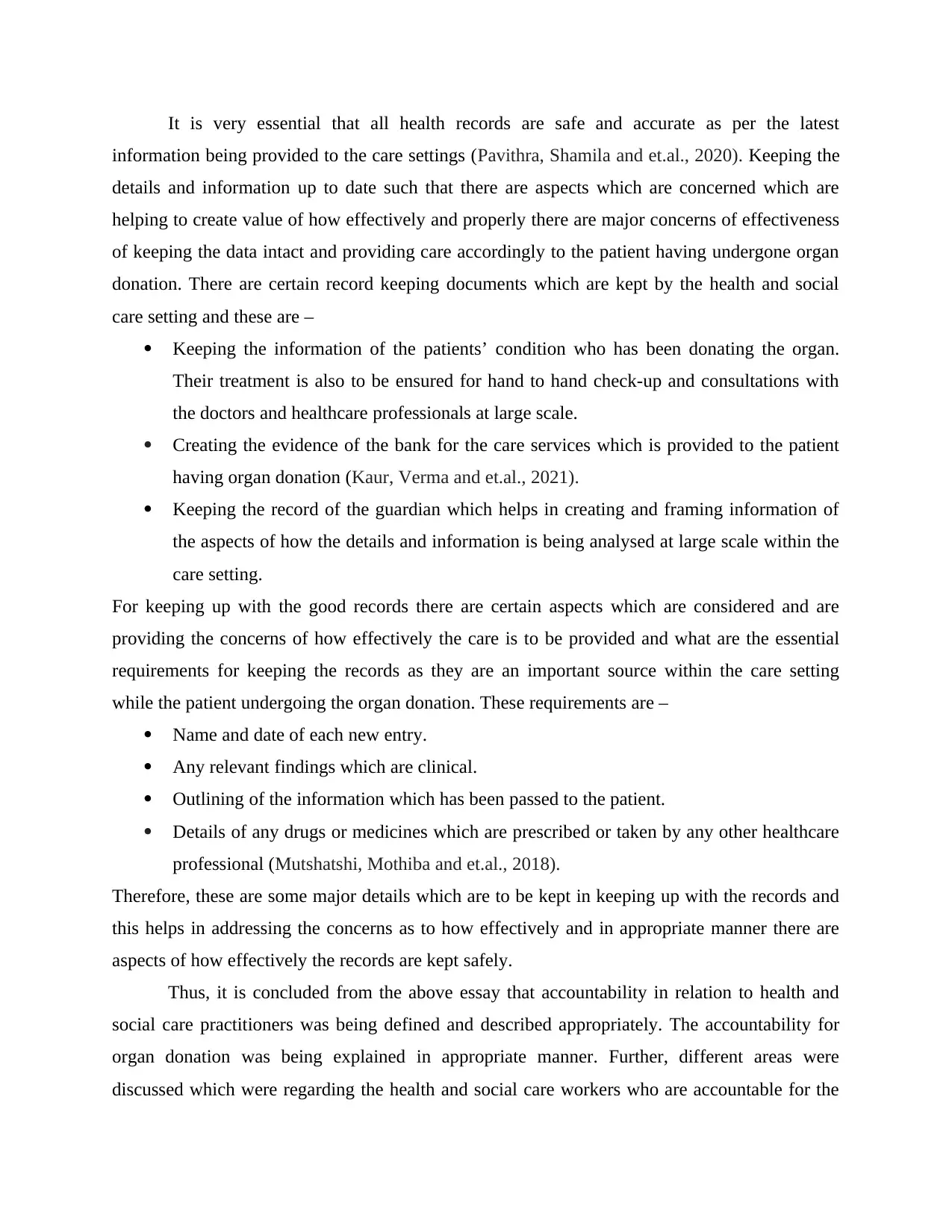
It is very essential that all health records are safe and accurate as per the latest
information being provided to the care settings (Pavithra, Shamila and et.al., 2020). Keeping the
details and information up to date such that there are aspects which are concerned which are
helping to create value of how effectively and properly there are major concerns of effectiveness
of keeping the data intact and providing care accordingly to the patient having undergone organ
donation. There are certain record keeping documents which are kept by the health and social
care setting and these are –
Keeping the information of the patients’ condition who has been donating the organ.
Their treatment is also to be ensured for hand to hand check-up and consultations with
the doctors and healthcare professionals at large scale.
Creating the evidence of the bank for the care services which is provided to the patient
having organ donation (Kaur, Verma and et.al., 2021).
Keeping the record of the guardian which helps in creating and framing information of
the aspects of how the details and information is being analysed at large scale within the
care setting.
For keeping up with the good records there are certain aspects which are considered and are
providing the concerns of how effectively the care is to be provided and what are the essential
requirements for keeping the records as they are an important source within the care setting
while the patient undergoing the organ donation. These requirements are –
Name and date of each new entry.
Any relevant findings which are clinical.
Outlining of the information which has been passed to the patient.
Details of any drugs or medicines which are prescribed or taken by any other healthcare
professional (Mutshatshi, Mothiba and et.al., 2018).
Therefore, these are some major details which are to be kept in keeping up with the records and
this helps in addressing the concerns as to how effectively and in appropriate manner there are
aspects of how effectively the records are kept safely.
Thus, it is concluded from the above essay that accountability in relation to health and
social care practitioners was being defined and described appropriately. The accountability for
organ donation was being explained in appropriate manner. Further, different areas were
discussed which were regarding the health and social care workers who are accountable for the
information being provided to the care settings (Pavithra, Shamila and et.al., 2020). Keeping the
details and information up to date such that there are aspects which are concerned which are
helping to create value of how effectively and properly there are major concerns of effectiveness
of keeping the data intact and providing care accordingly to the patient having undergone organ
donation. There are certain record keeping documents which are kept by the health and social
care setting and these are –
Keeping the information of the patients’ condition who has been donating the organ.
Their treatment is also to be ensured for hand to hand check-up and consultations with
the doctors and healthcare professionals at large scale.
Creating the evidence of the bank for the care services which is provided to the patient
having organ donation (Kaur, Verma and et.al., 2021).
Keeping the record of the guardian which helps in creating and framing information of
the aspects of how the details and information is being analysed at large scale within the
care setting.
For keeping up with the good records there are certain aspects which are considered and are
providing the concerns of how effectively the care is to be provided and what are the essential
requirements for keeping the records as they are an important source within the care setting
while the patient undergoing the organ donation. These requirements are –
Name and date of each new entry.
Any relevant findings which are clinical.
Outlining of the information which has been passed to the patient.
Details of any drugs or medicines which are prescribed or taken by any other healthcare
professional (Mutshatshi, Mothiba and et.al., 2018).
Therefore, these are some major details which are to be kept in keeping up with the records and
this helps in addressing the concerns as to how effectively and in appropriate manner there are
aspects of how effectively the records are kept safely.
Thus, it is concluded from the above essay that accountability in relation to health and
social care practitioners was being defined and described appropriately. The accountability for
organ donation was being explained in appropriate manner. Further, different areas were
discussed which were regarding the health and social care workers who are accountable for the
⊘ This is a preview!⊘
Do you want full access?
Subscribe today to unlock all pages.

Trusted by 1+ million students worldwide
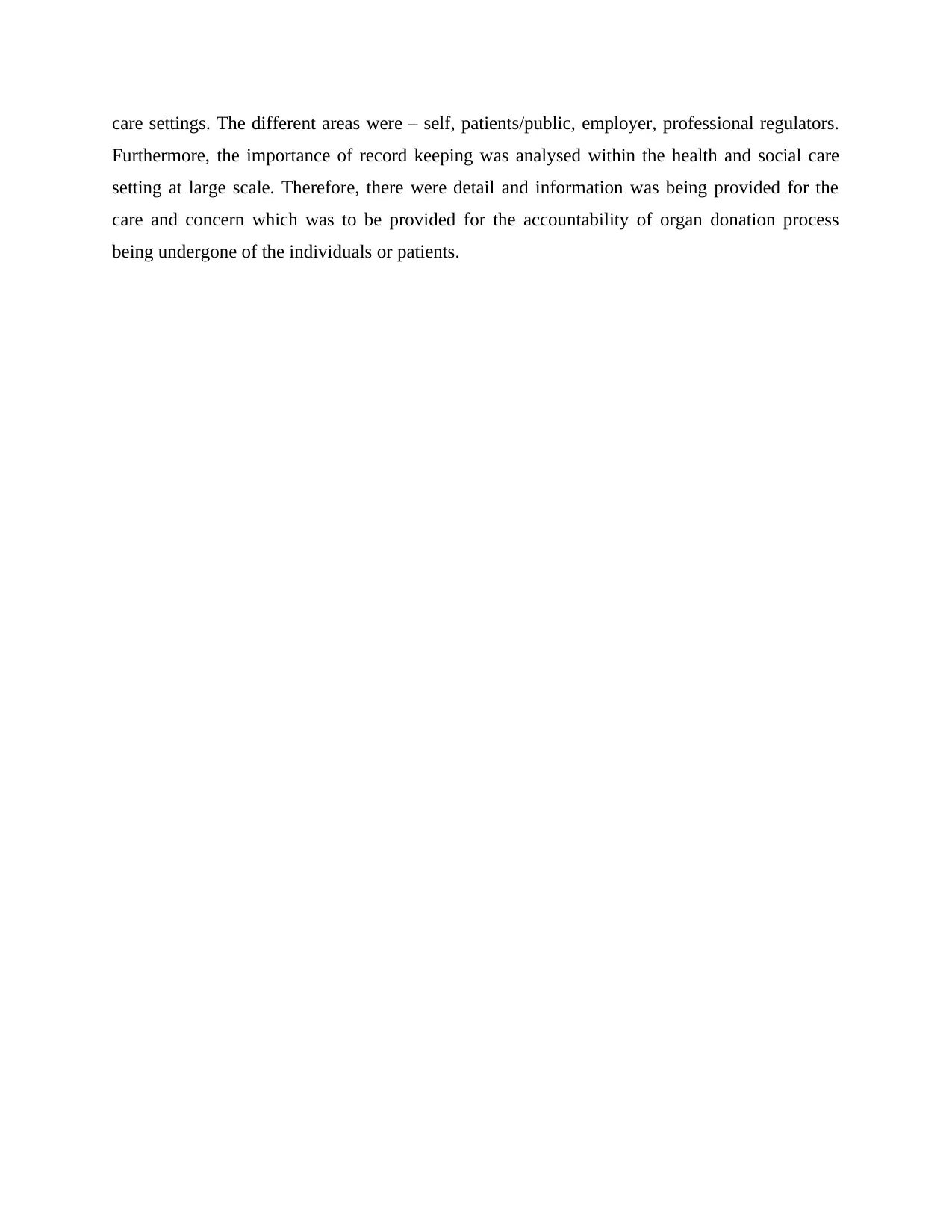
care settings. The different areas were – self, patients/public, employer, professional regulators.
Furthermore, the importance of record keeping was analysed within the health and social care
setting at large scale. Therefore, there were detail and information was being provided for the
care and concern which was to be provided for the accountability of organ donation process
being undergone of the individuals or patients.
Furthermore, the importance of record keeping was analysed within the health and social care
setting at large scale. Therefore, there were detail and information was being provided for the
care and concern which was to be provided for the accountability of organ donation process
being undergone of the individuals or patients.
Paraphrase This Document
Need a fresh take? Get an instant paraphrase of this document with our AI Paraphraser
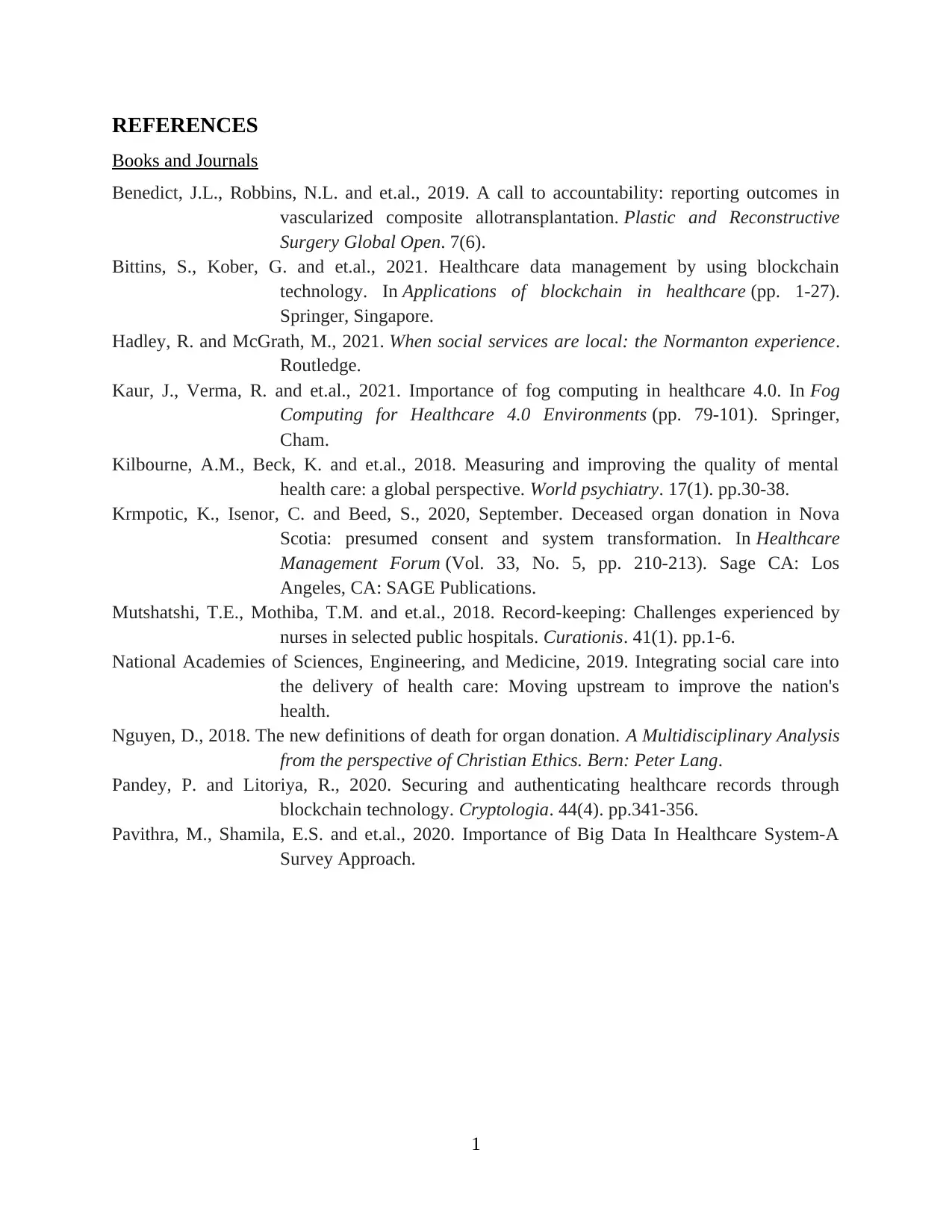
REFERENCES
Books and Journals
Benedict, J.L., Robbins, N.L. and et.al., 2019. A call to accountability: reporting outcomes in
vascularized composite allotransplantation. Plastic and Reconstructive
Surgery Global Open. 7(6).
Bittins, S., Kober, G. and et.al., 2021. Healthcare data management by using blockchain
technology. In Applications of blockchain in healthcare (pp. 1-27).
Springer, Singapore.
Hadley, R. and McGrath, M., 2021. When social services are local: the Normanton experience.
Routledge.
Kaur, J., Verma, R. and et.al., 2021. Importance of fog computing in healthcare 4.0. In Fog
Computing for Healthcare 4.0 Environments (pp. 79-101). Springer,
Cham.
Kilbourne, A.M., Beck, K. and et.al., 2018. Measuring and improving the quality of mental
health care: a global perspective. World psychiatry. 17(1). pp.30-38.
Krmpotic, K., Isenor, C. and Beed, S., 2020, September. Deceased organ donation in Nova
Scotia: presumed consent and system transformation. In Healthcare
Management Forum (Vol. 33, No. 5, pp. 210-213). Sage CA: Los
Angeles, CA: SAGE Publications.
Mutshatshi, T.E., Mothiba, T.M. and et.al., 2018. Record-keeping: Challenges experienced by
nurses in selected public hospitals. Curationis. 41(1). pp.1-6.
National Academies of Sciences, Engineering, and Medicine, 2019. Integrating social care into
the delivery of health care: Moving upstream to improve the nation's
health.
Nguyen, D., 2018. The new definitions of death for organ donation. A Multidisciplinary Analysis
from the perspective of Christian Ethics. Bern: Peter Lang.
Pandey, P. and Litoriya, R., 2020. Securing and authenticating healthcare records through
blockchain technology. Cryptologia. 44(4). pp.341-356.
Pavithra, M., Shamila, E.S. and et.al., 2020. Importance of Big Data In Healthcare System-A
Survey Approach.
1
Books and Journals
Benedict, J.L., Robbins, N.L. and et.al., 2019. A call to accountability: reporting outcomes in
vascularized composite allotransplantation. Plastic and Reconstructive
Surgery Global Open. 7(6).
Bittins, S., Kober, G. and et.al., 2021. Healthcare data management by using blockchain
technology. In Applications of blockchain in healthcare (pp. 1-27).
Springer, Singapore.
Hadley, R. and McGrath, M., 2021. When social services are local: the Normanton experience.
Routledge.
Kaur, J., Verma, R. and et.al., 2021. Importance of fog computing in healthcare 4.0. In Fog
Computing for Healthcare 4.0 Environments (pp. 79-101). Springer,
Cham.
Kilbourne, A.M., Beck, K. and et.al., 2018. Measuring and improving the quality of mental
health care: a global perspective. World psychiatry. 17(1). pp.30-38.
Krmpotic, K., Isenor, C. and Beed, S., 2020, September. Deceased organ donation in Nova
Scotia: presumed consent and system transformation. In Healthcare
Management Forum (Vol. 33, No. 5, pp. 210-213). Sage CA: Los
Angeles, CA: SAGE Publications.
Mutshatshi, T.E., Mothiba, T.M. and et.al., 2018. Record-keeping: Challenges experienced by
nurses in selected public hospitals. Curationis. 41(1). pp.1-6.
National Academies of Sciences, Engineering, and Medicine, 2019. Integrating social care into
the delivery of health care: Moving upstream to improve the nation's
health.
Nguyen, D., 2018. The new definitions of death for organ donation. A Multidisciplinary Analysis
from the perspective of Christian Ethics. Bern: Peter Lang.
Pandey, P. and Litoriya, R., 2020. Securing and authenticating healthcare records through
blockchain technology. Cryptologia. 44(4). pp.341-356.
Pavithra, M., Shamila, E.S. and et.al., 2020. Importance of Big Data In Healthcare System-A
Survey Approach.
1

2
⊘ This is a preview!⊘
Do you want full access?
Subscribe today to unlock all pages.

Trusted by 1+ million students worldwide
1 out of 9
Related Documents
Your All-in-One AI-Powered Toolkit for Academic Success.
+13062052269
info@desklib.com
Available 24*7 on WhatsApp / Email
![[object Object]](/_next/static/media/star-bottom.7253800d.svg)
Unlock your academic potential
Copyright © 2020–2025 A2Z Services. All Rights Reserved. Developed and managed by ZUCOL.





